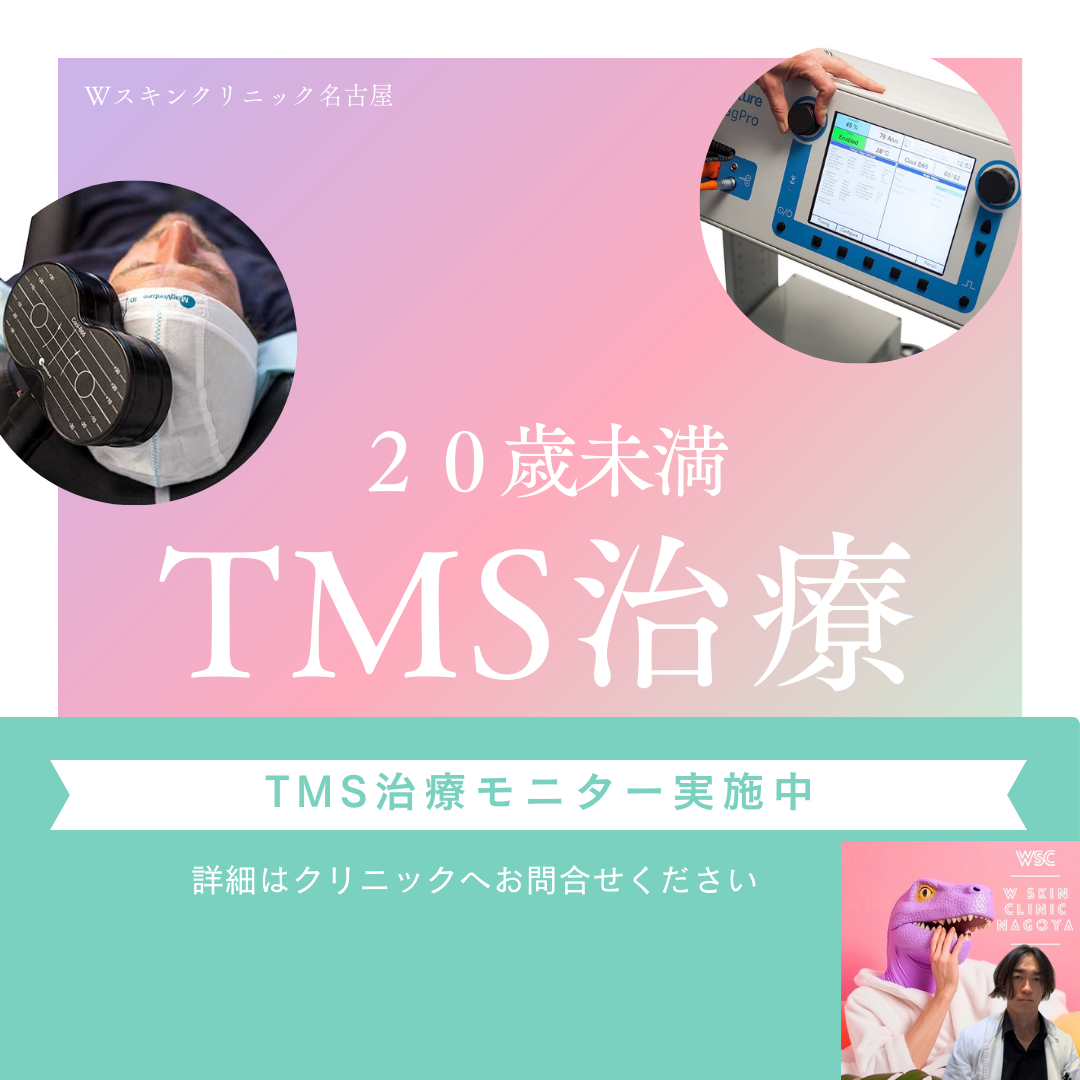NEWSお知らせ
2024.09.27|ブログ
20歳未満に対するTMS治療の有効性と安全性、当院でのモニター募集、について古屋の美容皮膚科医が解説

20歳未満に対するTMS治療の有効性と安全性、当院でのモニター募集、について古屋の美容皮膚科医が解説
こんにちは、Wスキンクリニック名古屋、院長の加藤晃司です。
今回は20歳未満に対するTMS治療の有効性と安全性、当院でのモニター募集について解説します。
TMS治療(経頭蓋磁気刺激、Transcranial Magnetic Stimulation)は、うつ病や強迫性障害(OCD)などの精神疾患に対して用いられる非侵襲的な治療法です。主に成人を対象に行われていますが、20歳未満の子どもや若者に対しても有効性や安全性が期待できるケースがあります。ただし、この年齢層に対するTMSの使用にはいくつかの注意点があります。
- TMS治療のメカニズム
TMS治療は、頭皮の上から磁気パルスを使用して脳の特定の領域を刺激します。主に前頭前野をターゲットにして、神経活動の調整を行い、うつ症状や不安症状の改善を促します。TMSは、薬物治療に抵抗性のある患者に対しても有効であることが知られています。
- 20歳未満におけるTMSの有効性
2.1 うつ病に対する有効性
20歳未満の若年層においても、TMSはうつ病の症状改善に効果を示すことがあります。特に、抗うつ薬に反応しない治療抵抗性のうつ病患者に対して、TMSが有効であることが複数の研究で示されています。
一部の研究では、青年期うつ病患者にTMSを使用した場合、症状の緩和や改善が見られたという報告もあります。
2.2 強迫性障害(OCD)や注意欠陥多動性障害(ADHD)
強迫性障害(OCD)に対するTMS治療の研究では、脳の特定の領域(特に前頭前野や基底核)に刺激を加えることで、症状が改善する可能性が示されています。20歳未満の患者でも、この効果が確認されつつあります。
ADHDの治療においても、TMSが注目されており、注意力の改善や多動性の軽減が期待されています。
2.3 発達障害や自閉スペクトラム症(ASD)
一部の研究では、自閉スペクトラム症(ASD)や発達障害に対してもTMS治療が有効である可能性が示されています。TMSが、ASD患者の社会的なスキルの向上や、言語機能の改善に寄与する可能性があるとされていますが、こちらもさらなる研究が必要です。
- 20歳未満に対するTMS治療の安全性
TMSは成人において比較的安全な治療法とされていますが、20歳未満の子どもや若者に対しても比較的安全であるとされています。ただし、いくつかのリスクや考慮すべき点があります。
3.1 短期的な副作用
頭痛や不快感: TMS治療の最も一般的な副作用は、一時的な軽度の頭痛や、治療部位の頭皮の不快感です。これらは通常、治療終了後まもなく消失します。
筋肉のけいれん: 一部の患者では、顔や頭部の軽い筋肉けいれんが起こることがありますが、これも一時的です。
3.2 てんかん発作のリスク
TMS治療には、非常に稀ではありますが、てんかん発作を引き起こすリスクがあります。20歳未満の患者でも同様に、てんかんの既往がある場合や発作のリスクが高い場合には、慎重な判断が必要です。
ただし、リスクは極めて低く、適切なプロトコルに従って治療を行えば、安全に治療を行えるとされています。
3.3 長期的な安全性に関するデータが不足
長期的な影響に関するデータが限られているため、特に20歳未満の子どもや若者におけるTMS治療の長期的な安全性には、さらなる研究が必要です。
- TMS治療を行う際の注意点
他の治療との併用
認知行動療法(CBT)や薬物療法と併用することで、TMSの効果を高めることが期待されます。特に、重度のうつ病やOCDなどでは、多面的なアプローチが有効です。
- まとめ
20歳未満に対するTMS治療は、治療抵抗性のうつ病や強迫性障害(OCD)、ADHDなどに対して有効性が認められつつあり、一部の研究では安全性も確認されています。ただし、長期的な安全性に関するデータはまだ不十分なため、適切な診断と個別の治療計画が必要です。
当法人ではTMS治療が日本に導入されてからすぐに治療に取り入れ、多くの患者さんの治療に使ってきました。
さまざまな疾患、状態、に対して治療を行ってきたため、経験は多く蓄積しています。
現在もモニター募集しており、今後もデータ解析を続けていきます。
モニター治療にご興味のある方は、クリニックまでお問合せください。
Wスキンクリニック名古屋での、TMS治療はこちら
https://www.w-clinic-nagoya.com/tms
現在TMS治療のモニター募集しております。
ご興味のある方は、クリニックまでお問い合わせください。
Wスキンクリニック名古屋
理事長 加藤晃司
当院では無料でスタッフカウンセリングを行なっております。
お気軽にご予約くださいませ
Wスキンクリニック名古屋 (美容皮膚科)
https://www.w-clinic-nagoya.com/
〒461-0005 愛知県名古屋市東区東桜 2-4-1 第3コジマビル6F
TEL 052-7377-7117(10:00~19:00)
LINE ID @w.nagoya
高岳駅より徒歩4分 / 新栄町駅より徒歩5分
お車でお越しの方
名鉄協商パーキングチケットをお渡しいたしますので、クリニック近くのパーキングをご利用ください。
ご予約、お問合せ、Wスキンクリニック名古屋公式LINEからも可能です。
LINE ID : @w.nagoya
友達追加は↓から
Wスキンクリニック名古屋公式インスタ↓
https://www.instagram.com/w.skinclinic.nagoya?igsh=NHhoODFnaXB2b2ll&utm_source=qr
Wスキンクリニック院長 加藤晃司インスタ↓
https://www.instagram.com/w.skin.nagoya.kojikato?igsh=aW9nbWZwNjNjZ3pz&utm_source=qr
Effectiveness and Safety of TMS Treatment for Individuals Under 20, and Information on Monitor Recruitment at Our Clinic
Hello, I’m Koji Kato, the director of W Skin Clinic Nagoya.
In this article, I will explain the effectiveness and safety of TMS treatment (Transcranial Magnetic Stimulation) for individuals under the age of 20, as well as details regarding our monitor recruitment.
TMS treatment is a non-invasive therapy used to treat mental health disorders such as depression and obsessive-compulsive disorder (OCD). While it has primarily been used in adults, there is growing evidence to support its effectiveness and safety for children and adolescents under 20. However, certain considerations must be taken into account when using TMS in this younger population.
- How TMS Works
TMS therapy uses magnetic pulses applied to specific areas of the brain, primarily targeting the prefrontal cortex to modulate neural activity and improve symptoms of depression and anxiety. It has shown effectiveness even in patients resistant to medication.
- Effectiveness of TMS in Individuals Under 20
2.1 Effectiveness for Depression
TMS has shown effectiveness in alleviating symptoms of depression in individuals under 20, particularly for treatment-resistant depression where antidepressants have failed. Several studies have reported symptom relief or improvement in adolescent depression patients using TMS.
2.2 Effectiveness for OCD and ADHD
Research into the use of TMS for OCD suggests that stimulating specific areas of the brain, particularly the prefrontal cortex and basal ganglia, may alleviate symptoms. This effect is being increasingly observed in younger patients.
For ADHD, TMS is gaining attention for its potential to improve attention span and reduce hyperactivity.
2.3 Effectiveness for Developmental Disorders and Autism Spectrum Disorder (ASD)
Preliminary studies suggest that TMS may be effective for individuals with ASD or developmental disorders, potentially improving social skills and language functions. However, further research is necessary to confirm these effects.
- Safety of TMS Treatment in Individuals Under 20
TMS is generally considered safe for adults, and it is also regarded as relatively safe for children and adolescents under 20. However, some risks and considerations should be taken into account:
3.1 Short-term Side Effects
Headache or discomfort: The most common side effects of TMS are temporary mild headaches or discomfort at the treatment site. These symptoms typically subside shortly after treatment.
Muscle twitches: Some patients may experience mild facial or head muscle twitches, but these are also temporary.
3.2 Risk of Seizures
There is a very low risk of triggering seizures with TMS treatment, particularly in patients with a history of epilepsy or those at higher risk of seizures. Careful evaluation is necessary before proceeding with treatment in these cases.
That said, the risk is minimal, and treatment can be conducted safely following appropriate protocols.
3.3 Lack of Long-term Safety Data
Since data on the long-term effects of TMS in individuals under 20 is limited, further research is needed to ensure its long-term safety in this age group.
- Considerations for TMS Treatment
Combining with Other Therapies
TMS treatment can be combined with cognitive-behavioral therapy (CBT) and medication to enhance its effectiveness. This multi-faceted approach is particularly useful for severe depression or OCD.
- Conclusion
TMS treatment is showing promising effectiveness for treatment-resistant depression, OCD, ADHD, and other conditions in individuals under 20, with studies confirming its safety in some cases. However, due to the limited long-term safety data, proper diagnosis and a tailored treatment plan are essential.
Our clinic has been using TMS therapy since it was introduced in Japan, and we have accumulated a wealth of experience treating a variety of conditions.
We are currently recruiting participants for our monitor program and will continue to collect data and analyze outcomes.
If you are interested in participating in our monitor program, please contact our clinic for more information.




